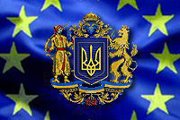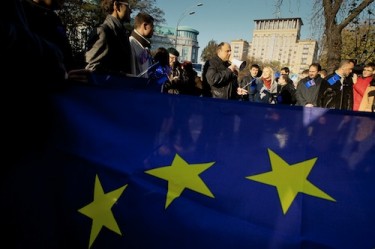Saturday, October 29, 2011
In September 2008, Ukraine seemed headed towards signing an Association Agreement with the European Union the following year, in 2009. Three years later, in 2011, the Agreement has still not been concluded.
The latest obstacle to finalizing the process is the Oct. 11 sentencing of former Prime Minister Yulia Tymoshenko. A resolution passed by the European Parliament on Oct. 27 describes the 7-year jail sentence given to Tymoshenko "as a violation of human rights and an abuse of the judiciary for the purpose of the political suppression of Ukraine's leading opposition politician." The resolution also warns of the potential consequences for the EU-Ukraine relations:
[...] a failure to review Yulia Tymoshenko's conviction will jeopardise the conclusion of the Association Agreement and its ratification, while pushing the country further away from the realisation of its European perspective [...]
It remains to be seen whether the Ukrainian authorities manage to successfully contain the geopolitical fallout of their domestic policies. Meanwhile, ordinary Ukrainians are beginning to take some of the matters into their own hands, voicing their commitment to democratic values, urging fellow citizens not to remain silent, and searching for optimal ways to interact with Ukrainian and European politicians on a grassroots level in order to help make the country a better place to live in.
On Oct. 20, a group of about 200 people, many of them journalists, gathered in front of the Ukrainian Parliament in Kyiv to convey this short message to the authorities: "We are Europeans."
The turning point for many of them must have been the EU's Oct. 18 decision to postpone President Victor Yanukovych's visit to Brussels for Association Agreement-related talks (the Ukrainian leader ended up paying a visit to Cuba instead) - as well as the looming prospect of Ukraine joining Russia, Belarus, and Kazakhstan in the so-called Eurasian Union.

The logo of the "We are Europeans" Facebook group (features the EU flag and the Ukrainian coat of arms)
Yevgeniy Ikhelzon [uk, ru], one of the organizers of the "We are Europeans" rally, wrote [ru] that it had taken just two days and "not a single phone call" to bring the people together: online social networks and blogs had been used to spread the word. As a follow-up to the Oct. 20 event, a Facebook group [uk, ru; 1,620 members] and a Facebook community [uk, ru; 596 'likes'] were set up, and later a number of much smaller regional Facebook branches were registered as well (uk, ru: Lviv, Crimea, Zaporizhzhya, Volyn, Kherson, Kharkiv, Ternopil, Dnipropetrovsk).
On his Ukrainska Pravda blog, Ikhelzon offered these explanations [ru] for the "We are Europeans" initiative:
Oct. 19, 2011:
[...] We want to live by the European laws, we don't need a new Iron Curtain. [...] Even though Europe is indeed facing a crisis now, it is just an economic crisis, not a crisis of values. [...]
***
Oct. 20, 2011:
[...] - European values do resemble what free people call common sense. [...]
- The Association Agreement with the EU includes a number of legislative requirements, which [if implemented] may really change the situation in Ukraine. [...]
- There is nothing that prevents Ukraine from fitting the criteria. Serbia, which had a war a very short time ago, will soon get an EU candidate status. We didn't have a war, we didn't have ethnic cleansing. All that needs to be done is replacing the occupation-style governing system with a human and humane one, turning the state around so it faces the citizens. [...]
- Joining [Vladimir Putin's] Eurasian Union will not bring about any changes for deregulation of the economy, human rights and civil liberties. [...] That is, [the President of Kazakhstan Nursultan Nazarbaev] is not going to mind accepting Ukraine into this organization because Tymoshenko is still in jail. Basically, this gathering of former communists and KGB people do not care about such "trifles" - for them, [gaining profit] is the main thing. [...]
Here is what some members of the "We are Europeans" Facebook group are saying about Ukraine and the EU:
Oleksandr Oleks. [uk]:
Ukraine's EU aspirations mean very little on their own. If this happened tomorrow and we got a chance to move freely and work in Europe, perhaps half of Ukraine's population would [re-settle there] the day after tomorrow. As for the middle class, all 100 percent would probably move [out of Ukraine]. It has to be emphasized that the most important thing isn't joining the EU, but adopting the European values in Ukraine: first of all, the ability to defend one's property rights, the right to vote in fair elections, to control the work of the authorities, of the police and others. This is when the issue of joining the EU would not be that urgent anymore, and Europe would be more interested in us than we are in it.
***
Adriana Bubnovska [uk]:
[...] I don't want to join anything, neither the United States, nor Russia. I want to live in a normal country with normal values and normal civil rights and liberties. The EU happens to personify this value-based choice. For me personally, it is absolutely not important whether we join the EU or not. What matters to me is that the Ukrainian society grows to understand that it's bad to steal, impossible to falsify the elections, nonsense to jail political opponents - instead of arguing with them during the elections, and that a democracy [cannot select certain convenient rules to play by, while refusing to observe the inconvenient ones].
Some of the group's members are debating the necessity of cooperating with Ukrainian politicians to implement their Europe-oriented goals. Journalist Vakhtang Kipiani wrote this [uk] on his Facebook page:
[...] a single protest isn't going to change anything. We need to form a group of people that will delegate their pro-European value-based interests to another group of people. This is called politics. Without pro-European politics we will not become part of the environment where the law comes prior to the wishes of a particular official. [...]
Some Ukrainian politicians seem interested in cooperating with the "We are Europeans" group, too. Iryna Gerashchenko, an MP from Our Ukraine–People's Self-Defense Bloc, suggested [uk] that the group's most active members take part in the upcoming meeting of the parliamentary committee on the European integration that she is a member of, to "express their position and concern about the reverse processes in this sphere."
So far, there is no consensus in the group on whether it is worth it to allow politicians into this grassroots movement. In a comment to Gerashchenko's note, Ostap Kryvdyk thanked her for her initiative, which he considers useful - "a window to the legislative process, and a link to Western policymakers." Oleg Zavada, on the other hand, is one of those who feel they do not share any common ground with the Ukrainian MPs:
[...] I'm afraid of catching the [virus] of conformism, narcissism, [euro-loserism] from them, and losing whatever remains of the European prospects, because some of them have as much to do with the European standards as I have with Sharia law.

"We are Europeans!" rally in Kyiv, Ukraine. Photo by Sergei Svetlitsky, copyright © Demotix (26/10/2011)
The second "We are Europeans" rally took place on Oct. 26 in Kyiv. Even though, according to reports [ru], it was less numerous than the first one, the activists managed to draw attention of some of the European diplomats to their cause, by handing the group's Open Letter on the State of Relationships between Ukraine and the European Union [en] to Miroslav Lajčák, the EU's External Action Service's Managing Director for Russia, Eastern Neighbourhood and Western Balkans, who was in Kyiv at the time.
Yevgeniy Ikhelzon posted a link [uk, ru] to the Ukrainska Pravda article [uk], which quoted Lajčák saying that "the desire of the majority of Ukrainians to move towards the European Union is very important, and every demonstration of this is very important and significant." Ikhelzon concluded [ru]:
This is the message that we need to get out into the streets and that this is what is expected from us.
No comments:
Post a Comment